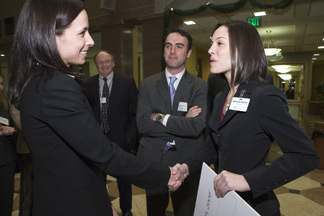Johnson School students sell advice on MasterCard IPO in first annual case competition
By Anne Ju

Under the watchful eye of Citigroup executives, Johnson School students applied complex financial concepts to a real-world situation during the school's pilot Integrative Case Competition for first-year students on Dec. 10 at Sage Hall.
Assigned randomly to 59 teams, the 253 students demonstrated, through financial statements, PowerPoint slides and old-fashioned powers of persuasion, whether becoming a publicly traded company would be the right move for the credit card company MasterCard.
Part of the students' final exams for their required Managerial Finance and Strategy courses, the competition was sponsored by Citigroup and culminated in awards for the top three cases presented.
MasterCard did, in fact, have an initial public offering (IPO), in May 2006. The students were instructed to envision that the IPO was still imminent, to weigh the reasons for it, and to demonstrate their valuation of MasterCard's stock. They had just 44 hours to prepare their presentations.
Following the final presentation, judges Alex Ivanov, MBA '00, and Faith Massingale, both Citigroup representatives, detailed the real story of the MasterCard IPO -- in which Citigroup was involved as one of the credit card company's original member banks and card issuers.
Johnson School Dean Robert Swieringa noted that Ivanov's and Massingale's final words were an appropriate capstone to the event.
"Being able to have [Ivanov] talk about how it actually unfolded, and what the issues were, put a nice closure on everything," Swieringa said.
Winning the $3,000 cash prize for first place was Team No. 24: Clint Stone, Shahnaz Shushtari, Mirek Zak and Roberto Tamaso, who, like five of the six team finalists, argued for a "buy" option on MasterCard's first public stock sale.
Stone credited the competition with forcing him to "think deeply" about some of the concepts discussed in his Finance and Strategy courses and apply them to a vast topic, with little time to waste.
"It was fun in that regard," he said.
The competition exceeded the expectations of Douglas Stayman, associate dean for curriculum, who said he was especially pleased with the energy and enthusiasm of the student teams.
"The amazing thing is that the students really learned something about what they know, and they also learned something about what they don't know," Stayman said.
The second-place team, Elizabeth Donohue, Fahim Razzaque, Jaspreet Shahpuri and Andrew Storey, won $1,500. A $500 cash prize was also awarded to the third-place team: Yashodhan Gokhale, Elizabeth Langlois, Rajesh Manglani, Tushar Virmani and Janssen Wee.
The Citigroup representatives on the judging panel included Massingale, head of global cards for the Global Consumer Group; Ivanov, vice president of Equity Capital Markets; Drew Pascarella, MBA '01, vice president of Technology Investment Banking; Melissa Middleton, MBA '04, Technology Investment Banking associate; Debra Maysonet, staffing and talent director; Deborah Warner, vice president and director of Career Development; Jennifer Tutak, Global Banking recruiter; and Vicky Serrot, relationship manager.
The other two judges for the finals were Johnson School faculty Roni Michaely, who authored the MasterCard case document, and Vrinda Kadiyali.
Media Contact
Get Cornell news delivered right to your inbox.
Subscribe